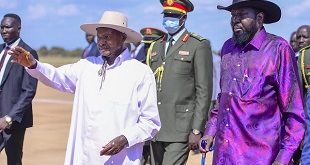-addresses-the-press-on-July-30-at-the-CEHURD-offices-in-Kampala.gif)
A consortium of civil society organisations filed a case in the Constitutional Court in Kampala on July 30 against the government to declare the Plant Variety Protection Act, 2014 null and void.
The law was passed by Parliament on Dec. 20, 2013 and was assented to by President Yoweri Museveni on June 21, last year.
The petitioners who included; the Centre for Health, Human Rights and Development (CEHURD), Food Rights Alliance Uganda (FRA), the Southern and Eastern African Trade Negotiations Institute (SEATINI) and Action Aid Uganda argue that the Plant Variety Protection Act is unconstitutional because it gives all the produce cultivated by farmers to the owners of the seeds, plants and propagating material which the farmers have used to cultivate that produce.
The petitioners also accuse, Rebecca Kadaga, the Speaker of Parliament, for not establishing whether there was quorum in Parliament before passing the law which denied MPs who represent many farmers the right to choose whether they wanted the bill to become law or not.
They also accuse the government for not consulting Ugandan citizens when they were creating the unlawful provisions of the Act which essentially have taken away the farmers rights.
The Parliament of Uganda has on several occasions including while creating the Marriage and Divorce Bill, 2009 and the Biotechnology and Biosafety Bill, 2010 instructed MPs to consult their constituencies on matters being legislated to ensure individual participation in the legislation.
However, it is not clear why the MPs did not go back to their constituencies to consult the people on an important bill that affects their livelihoods.
“It is shocking that in other laws such as the Domestic Relations Bill, Parliament sent out MPs to consult but on matters of agriculture which touches 80% of Ugandans, it remained an elitist discussion done in committees of Parliament,” said Moses Mulumba, the executive director of CEHURD.
“This is fatal because communities are represented through Parliament and the moment you pass a law without quorum it means that aspect of representation under Article 38 of the Constitution is actually missed.”
According to Mulumba, the plant variety protection law in its present form has a significant impact on the livelihoods of farmers in Uganda today and it is therefore imperative that constituents be consulted on the content of the Bill to ensure that their interests were represented and yet the Parliament chose to ignore them without sufficient cause as they legislated away their property.
“Uganda’s Constitution calls upon the state to take appropriate steps to encourage people to grow and store adequate food.
“The introduction of the Plant Variety Protection Act is a retrogressive measure with the potential to adversely affect food security in Uganda,” he said.
The four civil society organisations are demanding from government to act urgently and correct the errors in the Act.
“We all know that small scale farmers are the backbone of Uganda’s economy and that farming employs up to 80% of Ugandans.
“It is absurd that we have a law in Uganda that intends to take away the rights of farmers in future. If you buy a variety from a breeder, you must not sell any reproductive part of that variety, so what you are left with is subsistence.”
The moment you buy a variety and it is protected by a breeder, then the law takes away all the powers you have to sell this property.
Mulumba said there are three critical things which make this law rather difficult constitutionally but also in light of rights of farmers.
The speaker failed to ascertain the number of MPs in Parliament and as to whether there was quorum.
Secondly throughout the process of making this law, it is very difficult for somebody to tell you that communities were adequately consulted on the law.
“That is not acceptable.”
“It is very dangerous for you to require that even after I have bought a seed from you, that you still come to me and enforce that I can’t sell the products that have come out of it or I can’t replant that particular seed.”
“So the requirements under Section 13 and 15 are particularly problematic because the rights of any intellectual property owner are exhausted at the time of sale.”
“We want the Constitutional Court to declare particular sections of the law as unconstitutional but we also want to ensure that Parliament learns that when they are executing their mandate the community has given them to do; they do so on behalf of the communities and as such they have always come back to do the consultations.”
David Kabanda, the programmes coordinator at CEHURD, said as civil society, they have been asking themselves what the real motive for passing this law which will clearly impact the livelihood and the right to food of Ugandans was.
“We all know that many people survive on agriculture and the moment you take away that power from them, and then it is not clear for whom the MPs are legislating.
“Petitioners are going to court to specifically expunge this legislation off the legal framework in Uganda.”
Agnes Kirabo, the executive director of Food Rights Alliance Uganda said the grant of exclusive rights to plant breeders over reproductive material of plant varieties amounts to privatization of Uganda’s food system and holds common farmers at ransom.
“Seed is at the heart of the food system in Uganda and is the only source of livelihood for farmers,” said Agnes Kirabo, the executive director of Food Rights Alliance Uganda.
Mbalangu Gonzaga, the legal officer for Food Rights Alliance Uganda, a local NGO working on policy issues on food, food security and agriculture said the law protects alien interests considering that when you look at the way the breeder was defined in the law.
 The Independent Uganda: You get the Truth we Pay the Price
The Independent Uganda: You get the Truth we Pay the Price



